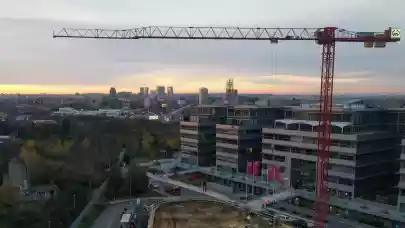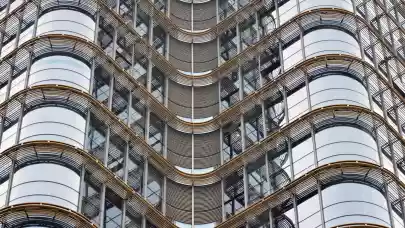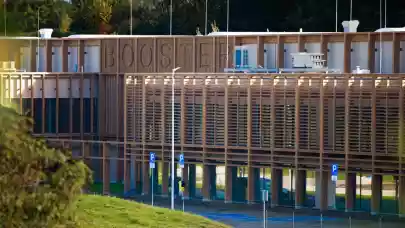
It is anticipated that the market will experience the transition from being perceived as a problem to an opportunity for many investors and funds in 2024. CBRE summarised this year's developments in the Czech commercial real estate market and provided an outlook for 2024.
Clare Sheils, Managing Director, CBRE Czech Republic, comments: “It is anticipated that the market will experience the transition from being perceived as a problem to an opportunity for many investors and funds in 2024. This shift in sentiment that we are looking forward to in the second half of the year may see the potential for growth and profitability for many players in the real estate sector as the market rebounds from the downturn. In addition to the evolving market sentiment, it is increasingly important for commercial real estate owners to understand the potential impact of ESG factors on their assets, such as energy efficiency, carbon footprint, social impact, and ethical business practices. By proactively addressing these considerations, owners can align their investments with responsible practices and enhance the long-term value and attractiveness of their properties.”
Sustainability: talk of ESG turning into real action
The growing interest in obtaining BREEAM, LEED or WELL certification for buildings is not just a fleeting trend but a steadily expanding service within the ESG landscape. Companies are becoming progressively aware of the tangible benefits these certifications bring regarding cost efficiency and environmental impact. As a result, the demand for these services is on a consistent upward trajectory.
Alongside the surge in interest in sustainability certifications, another prominent trend is the increasing demand for decarbonisation and Net Zero Carbon (NZC) studies. Businesses increasingly seek to create actionable investment CAPEX plans to meet their net-zero targets. This growing trend signifies a more profound commitment to environmental sustainability, directly impacting market strategies. As we progress, these studies are set to become a standard component in investment planning, shaping the future of sustainable business practices.
Martin Vejražka, Head of Sustainability, describes: "Looking ahead, all the factors - from the rising interest in BREEAM, LEED and WELL certifications, the increasing demand for decarbonisation and NZC studies, the importance of a robust ESG strategy, to the need for comprehensive emission and non-financial reporting - will undoubtedly gain even more prominence. This will be particularly influenced by the evolving legislative environment, notably the Corporate Sustainability Reporting Directive (CSRD) and growing commitment to Net Zero targets on the landlord and occupier side. As the CSRD's coverage expands in the coming years, it will further drive businesses towards sustainable practices, embedding ESG considerations even more deeply into the corporate landscape."
Investment market: A changing market
CBRE expects total Czech commercial real estate investment volumes to reach around €1.5 bln in 2024, representing a 15% increase y-o-y. Decreasing investment activity began in 2021 when investment volumes dipped just below €2.0 bln and since then have continued to fall 15-20% a year, with transactions repriced or put on hold. This decrease in investment volume was triggered by increasing uncertainty in the economic forecast and a swift rise in financing costs, with EURIBOR swap rates experiencing an increase of over 300 basis points. These elevated borrowing costs resulted in a cap rate decompression across all European regions and property sectors. For instance, since then, Czech prime yields have escalated across all sectors by 50-100 basis points. Prime retail yields were the least impacted, as some adjustments were already made during the Covid period.
Nonetheless, the current situation presents a glimmer of hope, with initial indications of inflation being managed and a potential reduction in interest rates. This provides a golden opportunity for real estate investors to capitalise on market risks, primarily reflected in pricing expectations, before a shift in sentiment.
Jakub Stanislav, Head of Investment Properties, adds: “The real estate market in the Czech Republic projects long-term stability, with no significant changes anticipated. This is reinforced by Moody's recent upgrade of its outlook on the Czech Republic from "negative" to "stable", signalling improved economic expectations. The global real estate industry is poised for a pivotal year, with opportunities for rebuilding on a stronger foundation. This comes in the aftermath of the pandemic-induced shift in work habits, geopolitical uncertainties, and financial market instability. On a promising note, the worst of inflation appears to be behind us, potentially causing the European Central Bank to halt interest rate hikes. First-rate cuts are expected in mid-2024. After the price falls of the past 18 months, the market risks are largely accounted for. The era of equities being the only viable alternative is nearing its end. As per the expectations of CBRE, a positive outlook is predicted for 2024, reflected in a projected increase in total investment volumes by 15%.”
Office market: flexible offices on the rise
During the first three quarters of 2023, CBRE monitored a slowdown in office leasing activity in Prague compared to the same period last year, in line with trends visible across Europe. In 2023, we expect to see a 15-20% reduction in take-up y-o-y. Going forward, we anticipate stable demand for office space in high-quality, sustainable projects to continue. However, some of this demand will be offset by the gradual return of secondary space, a trend we observe especially among the largest tenants.
At present, there are only a few new occupiers entering the Prague office market, and newcomers tend to start up in flexible office space. The flex market in Prague is now experiencing robust levels of interest from occupiers, and demand outstrips supply. Operators are struggling to find suitable premises for expansion, and the rise of flexible offices will continue through 2024.
Since Q3 2022, no new office construction has started on the market, and we expect a supply gap during late 2024 and onwards into 2025. Whereas for 2024, approx. 80,000 sqm is scheduled to be delivered, in 2025 new supply could drop to just 28,000 sqm. Based on our analysis of ongoing transactions, tenants are giving back on average 15-20% of their space. We believe the market will be able to absorb these secondary spaces. Limited new deliveries will keep the vacancy level around 8% in the coming quarters.
Prime rents are stable at €27.50/sqm/month, and we expect only marginal increases next year, driven mainly by indexation.
Simon Orr, Director of A&T-Offices, adds: “Due to a slowdown in leasing activity, we see upward pressure on incentives in certain locations. Price and location are still the driving factors for tenants, with sustainability increasingly part of the corporate agenda. We are aware of projects on the market with permits, which will start construction upon securing strong interest or even a pre-lease. Construction activity should start to recover next year; however, developers will remain cautious in this era of high construction costs.”
Industrial & logistics market: Back to the normal
The Czech Republic is still perceived as an attractive location for international occupiers due to its strategic location, stable political situation, and skilled labour; at the same time, occupiers are rethinking their global supply chains, which the Czech Republic may benefit from.
After two record-breaking years in newly leased space, the Czech industrial and logistics market has been experiencing a slowdown in demand so far during 2023, copying European market trends. This year, demand could drop by almost 40% y-o-y to around 900,000 sqm of newly leased space. And this is the activity we expect to see going forward: approx. 800,000–900,000 sqm newly leased annually, in line with the 5Y pre-Covid average.
The vacancy rate increased slightly during the first three quarters of 2023 and stood at 1.5%. However, it is expected to grow further. Currently, there is a record amount of space under construction – more than 1.4 million sqm. Over 40% of this space is built speculatively. At the same time, we start to monitor grey vacancies on the market, not only in the space offered for subleases but also in projects at the stage just before completion and designated as under construction until the space is leased.
Jan Hřivnacký, Head of Industrial Leasing, comments: “Currently, we are monitoring a structural change in demand. The importance of manufacturing companies is growing, with an almost 50% share on take-up in the first three quarters of 2023, while a slowdown in demand from e-commerce and 3PL companies is evident in total numbers. Prime rents are currently at €7.55/sqm/month, and we expect only a slight inflation-driven increase next year. In some of the most competitive regions, we might experience a downward pressure on rental levels.”
Retail market: inflation is the main driver
Retail development in the Czech Republic was driven only by retail park construction in 2023. At the end of 2023, the expansion of one shopping centre, Varyáda in Karlovy Vary, started. Another three to four shopping centres are expected to announce the commencement of construction in the upcoming year.
Despite improving confidence, consumers remained cautious and price-sensitive, with a tendency to save. The footfall level in shopping centres still has not reached pre-pandemic levels and stabilised at 5-10% below the 2019 level. This may imply a long-term change in customer behaviour and a new average footfall level. Meanwhile, turnovers in shopping centres, powered by high inflation, recorded an approx. 20% higher level than in 2019, real retail spending is expected to show a result more than 5% below 2019 in 2023. In 2024, the current forecast predicts moderate growth in retail spending.
Jan Janáček, Head of Retail Sector and A&T-Retail, adds: “The Czech Republic remained the most attractive country among international retailers when entering the CEE region, and several dozens of new retailers entered the market in 2023. Nevertheless, the ongoing downside risk related to high costs, customer price inflation and income inequality is causing caution in the market. As the significant growth of real estate costs is expected for the second year, we anticipate further intensive occupier-landlord dialogues, especially among less performing sectors.”



